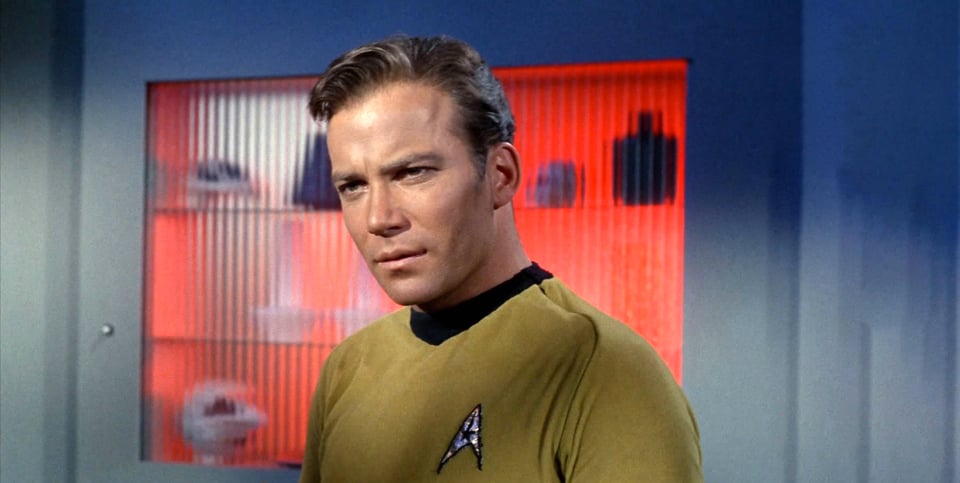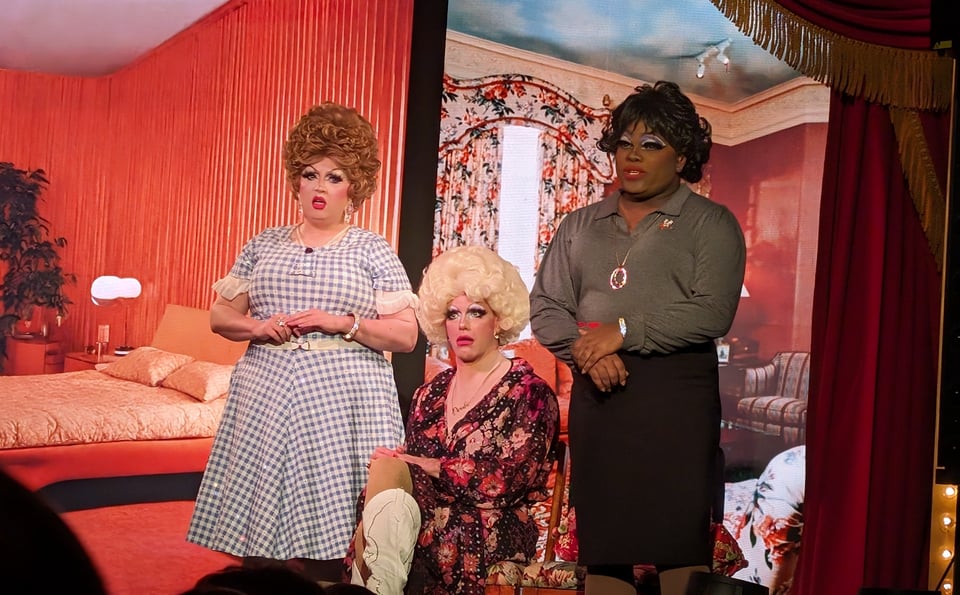I Stopped Loving Captain Kirk

I used to look up to Captain Kirk, Star Trek's fearless leader, when I was a kid. When I was seven or eight, I had a homemade Starfleet captain shirt, which I wore constantly until it wore out to shreds. Kirk was one of my all-time favorite heroes.
And then something terrible happened: I got a job.
In my early twenties, I had a string of bosses who were what I can only describe as bullies: they were psychologically abusive, they expected you to laugh at their terrible jokes, they sat unrealistic expectations and then berated you for not meeting them. One boss in particular kept pressuring me to commit fraud on in a bunch of minor but horrible ways, like calling up people and misrepresenting who I was and where I worked — and at one point, this boss tried to get me to dig up dirt on the board of directors of his own company. Another boss made a habit of tearing me down in meetings, often for no reason — just to underscore that he could screw with me at any time.
I would come home from one of these garbage jobs and turn on the television, too exhausted to do anything else.
Oh look! It's a classic Star Trek rerun, I love Star Trek! Except.... Captain Kirk started to remind me too much of my evil bosses. He was constantly demanding things that the his subordinates couldn't deliver — like, if you told him that something would take three hours, he would insist that it be done in one. He snapped at and berated his crew, often for no particular reason, and he made cruel jokes at the expense of people — mainly Mr. Spock, but also others at times. Kirk suddenly looked like a bully.
To be fair, Kirk was inconsistently written during the Original Series. Depending on which episode you watch, he's either a chuckling philosopher or a snarling taskmaster. I've read books about the making of Star Trek that claim that creator Gene Roddenberry would occasionally return from working on other stuff, and become appalled at the lack of military discipline depicted on the show. Roddenberry would rewrite scripts at random, to make Kirk more formal and strict, addressing the bridge crew as "navigator" and "helmsman" instead of "Chekhov" and "Sulu."
At the same time, Shatner was famously insecure and desperate to remind everyone that he was the star of the show, and I feel like that bleeds into his performance, whether he's playing Smiling Kirk or Snarling Kirk. Either way, he lords it over his subordinates, in contrast to Jean-Luc Picard, or to the relaxed, secure authority that Anson Mount exudes on Strange New Worlds.
I grew up in the 1980s, which was a great time for James T. Kirk. 1979's Star Trek: The Motion Picture had leaned into the dark side of Kirk: TMP's Kirk is self-centered and obsessed with being in command of the Enterprise even if it damages the future of humanity. He's threatened by the Enterprise's rightful captain, Willard Decker. But 1982's Star Trek II: The Wrath of Khan had set the tone for the next decade of Kirk: charming, whimsical, self-aware, magisterial — the kind of guy can say "Gentlemen, gentlemen!" and put a stop to a nerd squabble. He literally did that in a commercial that was on TV all the time:
Wrath of Khan also leaned into the vulnerability that was always part of the character, with Kirk confronting aging and the family he never got to have.
And before anyone jumps in to say it: No, Kirk was never a meathead. He was always portrayed an intellectual, who loved to ponder philosophy and history. (I sometimes wonder if Roddenberry modeled the character in part on his mentor, LAPD chief William H. Parker, who modernized and militarized the LAPD, eventually provoking the 1965 Watts riots. Roddenberry famously described Parker as a "philosopher" who eventually forgot himself and decided he was a god.) It's just that Kirk is obsessed with maintaining his dominance over his crew, in a way that's very much of its time but also a product of the men who created him.
It's no accident that the majority of episodes of the original Star Trek pit Captain Kirk against a foil of some sort:
1) another starship captain, who is on a destructive path
2) a planetary leader or diplomat who insists on doing the wrong thing in the face of all the evidence
3) an alien Captain who makes rash choices or crosses lines that Kirk wouldn't, or
4) either a literal god, or a computer impersonating a god.
Kirk regularly spars with petty dictators. The point of many episodes seems to be that Kirk is the best possible leader, because have you seen these other guys? The closest Star Trek comes to depicting a wise authority figure is the Organians, some all-powerful pacifists who force a peace treaty with the Klingons and then fuck off, never to be seen again.
Anyway, rewatching my beloved Star Trek episodes after experiencing some terrible bosses felt kind of like losing a friend.
At some point, I discovered the awesome power of quitting a terrible job and getting the fuck out of an abusive situation. I eventually wound up with bosses who were more humane and actually fairly chill individuals, until I finally became self-employed. And once I had a less sadistic boss, I was able to appreciate Captain Kirk a bit more. One time, I even had the impulse to tell a particular boss, "Thanks for giving Captain Kirk back to me," but that would have been a weird thing to say, so I stowed it. Was I projecting my hatred of my evil bosses onto Kirk, or was I seeing a dark side that was really there? Yes to both. I still can't rewatch the original Star Trek without thinking that Kirk's management style sucks.
In any case, those experiences left me with a strong conviction that capitalism isn't really about making money — at least not entirely. Many bosses seem to operate according to at least two conflicting imperatives: the profitability of their company, and their own egos. Where their need to feel powerful conflicts with the needs of their company, they'll usually find a way to put their own self-importance first. They'll promote people who flatter them instead of the people who do the best job, and they'll sabotage any good ideas that they can't take credit for. This is not a particularly original observation: many workplace sitcoms and management texts discuss it in great detail.
I was thinking about this recently, since there's been a resurgence of celebrating bullying as leadership, as I wrote about a while ago.
But also, I recently was lucky enough to see a drag performance of the movie 9 to 5, and I haven't been able to stop thinking about it. For those who missed it, 9 to 5 is a 1980 film starring Lily Tomlin, Dolly Parton, and Jane Fonda, about three harried office workers who team up to imprison their useless and egotistical boss. Once the boss is out of the way and the women are running things, suddenly the office becomes much more humane — but also efficiency and profits both go up, because workers are able to do their jobs instead of catering to a shallow fool.

The drag performance was adapted and directed by local literary celeb and drag performer Joe Wadlington, who starred alongside Jota Mercury, Coco Buttah and Vanilla Meringue. And it was an absolute revelation — I think you can see a recorded version of it on OasisTV. Casting Mercury, a drag king, as the garbage boss makes his oafish behavior funnier but also more stark, and the three drag queens do a wonderful job of dramatizing the plight of these oppressed office workers.
The movie 9 to 5 came in 1980, right at the dawn of the Reagan era — and we spent much of the 1980s celebrating visionary bosses, like Lee Iacocca and some guy named Donald Trump. And pop culture fell in love with Gordon Gekko. After this one brief vision of a garbage boss — and how much better things could be if we got rid of him — we snapped back to the cult of the brilliant leader. It's sort of ironic, in a way, that just as Nicholas Meyer was refashioning Kirk into a somewhat more lovable figure, the rest of the zeitgeist was doubling down on celebrating "strong" "leadership".
1980s R&B Songs Called "Kiss," Ranked
Yeah, you probably thought there was only one R&B/funk song called "Kiss" in the 1980s, right? You'd be wrong. I'm ranking them!
1) "Kiss" by Prince and the Revolution. Getting the suspense out of the way. Yes, this is the best of the bunch, of course. Prince gave this song to a group called Mazarati, but after hearing David Z's tight arrangement, he took it back and made it timeless.
2) "Kiss" by Total Contrast. This is one of two songs from 1987 (the year after the Prince song!) that used the title "Kiss." We'll get to the other one in a moment. Were these artists hoping people would think their songs were cover versions of Prince's? Hard to say, but there was definitely some chutzpah involved. In any case, this is a solid house-y dance song with a rhythm guitar hook that does kind of recall the Prince song. I wouldn't kick this song out of bed.
3) "Kiss" by Sugar Foot. Sugar Foot was the lead singer of the Ohio Players, and in 1985 he released a solo album produced by Roger Troutman of Zapp and Roger fame. "Kiss" is a cute, slinky song that starts subdued but opens out at the chorus into a typical Roger guitar-boosted groove. The lyrics are terrible though. Feels like a bit of a throwaway song.
4) "Kiss" by Mico Wave. Bootsy Collins produced Mico Wave's debut album, which boasts some proper bangers, including "Star Search," "Misunderstood" and "Sleeping Single." (Side note: Mico Wave tried to play the talk box, the instrument made famous by Roger Troutman, and lost eight teeth as a result, according to the excellent book How to Wreck a Nice Beach by Dave Tompkins.) Anyway, this song, which also came out in 1987, is a decent enough slow jam, but not terribly memorable.
FYI, I considered also including the song "The Kiss" by the Cure, from their 1987 album Kiss Me, Kiss Me, Kiss Me, but decided the definite article took it out of the running. There were a lot of songs about kissing in the 80s!
My Stuff
My next book review column should be out in the Washington Post sometime in the next week. And if you're looking for book recs, I have a huge backlog now!
On Saturday March 23, I'm once again helping to organize the Bookstore and Chocolate Crawl, where we visit all the bookstores in a neighborhood and buy tons of books, while also stopping for chocolate. This time around: Rockridge!
The latest episode of Our Opinions Are Correct is one of my favorites. We talk to the wonderful Evan Narcisse about how video game movies finally beat comic book movies, after twenty years of the opposite happening. Plus why do villains need to be sympathetic?
Your local comics shop probably still has New Mutants Vol. 4 and New Mutants: Lethal Legion, featuring Escapade, the trans superhero I co-created for Marvel. (To get the beginning of her story, you need to track down the 2022 pride issue.)
I've also written some books! The Unstoppable trilogy is a fun young-adult space fantasy with loads of ambient queerness. Never Say You Can't Survive is a guide to writing yourself out of hard times. Even Greater Mistakes is a weird, silly, scary, cute collection of stories.
